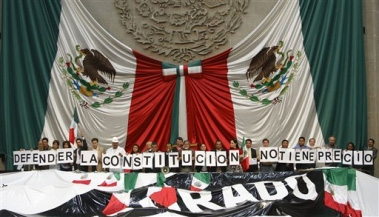
|
 |
 |
 News Around the Republic of Mexico | April 2008 News Around the Republic of Mexico | April 2008  
Oil Reform Debate Stirs National Pride in Mexico
 Catherine Bremer - Reuters Catherine Bremer - Reuters
go to original


| | Members of Mexico's Congress hold a sign that reads in Spanish "To defend the constitution has no price" as they continue their protest in Mexico City, Thursday. (Associated Press) | | |
Mexico City – When Mexico expropriated its fledgling oil industry in 1938, Mexicans handed over family jewels, silverware and chickens to fund a new state oil company and pay off the foreign firms being booted out.

Four decades later, a poor fisherman spotted grease bubbling up in the Gulf of Mexico, stumbling upon a huge oil field that brought a flood of petrodollars and put Mexico among Latin America's wealthiest nations.

Today, many Mexicans' pride in their oil – still the nation's main economic motor and the No. 3 source of U.S. crude imports – is creating resistance to a government plan to modernize the now creaking energy industry.

President Felipe Calderón, a pro-business conservative, wants to shore up flagging output and reserves by attracting foreign companies to Mexico with contracts that include cash incentives for successful projects.

But left-wingers say the plan smacks of privatization and a wave of protests and a blockade of Congress have thrown Calderón the toughest test so far of his 17 months in office.

“The expropriation was a huge effort for the nation. To sell off our oil would be a disgrace,” said Franco Flores, 63, who runs a car-washing business near the dated brown skyscraper where state oil monopoly Pemex is headquartered.
Polls show Mexico divided over his proposal so Calderón, a former energy minister and only the country's second president since seven decades of one-party rule ended in 2000, is playing on national pride to try and win support.

“While other countries have taken advantage of their deep-sea oil for years, Mexico hasn't been able to start,” he said in a televised speech. “It's time for all Mexicans to act with true patriotism to get the most out of our resources.”

In a country where the 16th century Spanish conquest and the U.S. annexation of Mexican territory in the mid-1800s are still keenly resented, many are defensive at the idea of foreign oil majors returning to Mexican soil.

Some also rue the privatization in the 1980s and 1990s of Mexico's telecom and railroad industries, which enriched moguls like billionaire Carlos Slim, now one of the world's wealthiest men, but left ordinary citizens complaining of high phone bills and rusted railways that go nowhere.

“Privatization is bad. We saw it with telephones and railways. Oil is all we have left. If they sell that, Mexico is finished,” said Flores, who limps on crutches as he washes Pemex workers' cars with soapy water kept in old oil drums.

“BETRAYAL”

While Brazil is exploring huge deep-sea oil deposits, Pemex's reserves, output and exports are all falling. Mexico recently slipped one place in official U.S. rankings to become the world's No. 10 crude exporter.

Pemex's hands are tied by a constitutional ban on foreign alliances, and it says it needs experienced partners to help it drill exploration wells in water over a kilometer deep.

Without that, Energy Minister Georgina Kessel warns Mexico may have no spare oil to export within 20 years.

But opponents say the claims are a ruse by politicians and Pemex directors who stand to get rich through deals with foreign oil majors re-entering Mexico.

“They say oil belongs to Mexicans but they act as if it belongs to the government,” said Hernan Mendez, 50, who has worked at Pemex for 25 years as an executive chauffeur.

Left-wing lawmakers have held a sit-in protest in both houses of Congress since April 10 to block the reform proposal.

Militant leftists have called the oil bill a “betrayal of the fatherland” and thousands have protested on the street.

Calderón could pass the bill with backing from centrists in Congress, but some fear that ignoring noisy street protests could cost their parties in congressional elections next year.

Government-run television ads say Mexico has fallen behind peers like Brazil or Norway, whose state oil companies have used limited private investment to become industry leaders.

But comparing Mexico to other oil producing countries and their achievements get short shrift.

“In today's Mexico, it would be like trying to argue that God doesn't exist ... with a group of fanatics,” wrote Carlos Elizondo Mayer-Serra in an editorial in the daily Reforma.

(Editing by Kieran Murray) | 
 | |
 |



